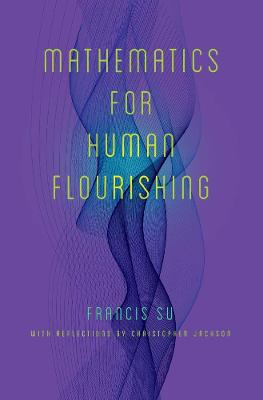I don't know what drew me to 'Mathematics for Human Flourishing' by Francis Su. If I'm being completely honest, I think I found the title intriguingly unusual. Without actually paying attention at the time to who the author might be, the cadence of the title had a very eastern feel to it.. and being of mixed Asian and Native Hawaiian descent.. sometimes my eye has a tendency toward those fluid sort of word dances.
Perhaps, not so ironically.. in hindsight, as a student I was incredibly bored by mathematics and science. Not initially of course, in grade school instructors often seem to have a different approach to learning than in later grades. Not simply because the age of the students is younger, but in my experience most of them seemed to be in it for the kids and often genuinely liked them. As an adult, I know several people who teach junior high or high schoolers and none of them like their students as a rule.
Likewise, I didn't much care for the instructors who wanted me to fit in a convenient box. And if I didn't like them, I didn't work well for them.. add to that.. the curriculum of math and science in traditional schools.. and I didn't even want to be there. Amusingly enough, I understood it fine. I could teach others, even those in college classes above me. Though I was a student who strongly disliked those classes, as an adult.. some of my favorite casual reads are books on quantum physics and quantum mechanics (science).. and what must you have for those? Mathematics. There's the irony for you.
It probably seems as if I'm off on a tangent here and not reviewing the book, but bear with me.. my apparent tangent relates. What I expected from the book was for it to be heavily focused on mathematical theory and possibly full of formulas and problem solving.. the latter of which I love.. with a few anecdotes which might be interesting.
Don't get me wrong. Sprinkled throughout the book there is some of that, but it's much more than it might seem.
Su actually spends much of his time discussing the ripple effects that mathematics and the attitudes we're unintentionally groomed to have towards them have on our lives. He talks about how differently we might take to the topic if the focus was on learning and exploring, rather than ultimately on the grade and the correct solutions. The experience of exploration in mathematics leading students to find it more fun.. more engaging.. rather than turning away from it because it's shoved at them with a set of hard rules and expectations for results.
There's some discussion on the fact mathematics are used more frequently in our every day lives than we understand. That there are algorithms choosing what we'll see, what opportunities we'll get, who or what we might make contact with and how a deeper understanding of all that might benefit us.
He talks a great deal about spotting patterns (which are my go-to in just about every setting), and how our unknown inherent biases affect our decision making. There was a story in fact.. about restaurants with different menus that was surprising to me at first.. but when I got to thinking about what lead them to this method.. I began to see how it might happen more regularly than people realized.
Certainly, there are assumptions made upon every interaction.. be it personal or professional. We judge, if not by race or common stereotype, at least by our own experiences. And that can lead us to approaching the same situation in an entirely different way, simply because we perceive a certain level of understanding within the other person. It's fascinating really.
In addition to the things I mentioned, I genuinely enjoyed his reflection on letters sent to him by Christopher Jackson.. a man who discovered mathematics as an inmate in a federal prison. Christopher shares some truly introspective self-assessment with the author during the exchanges and the two seem to have forged quite a friendship over the years.
The author touches on a lot of topics that are afflicting us currently and I highly suggest giving this book a try. I think you'll be pleasantly surprised by the content and his insight.
(More reviews like this at Betwixt The Sheets.)
(I received this title as an ARC. All opinions are mine and freely given.)
